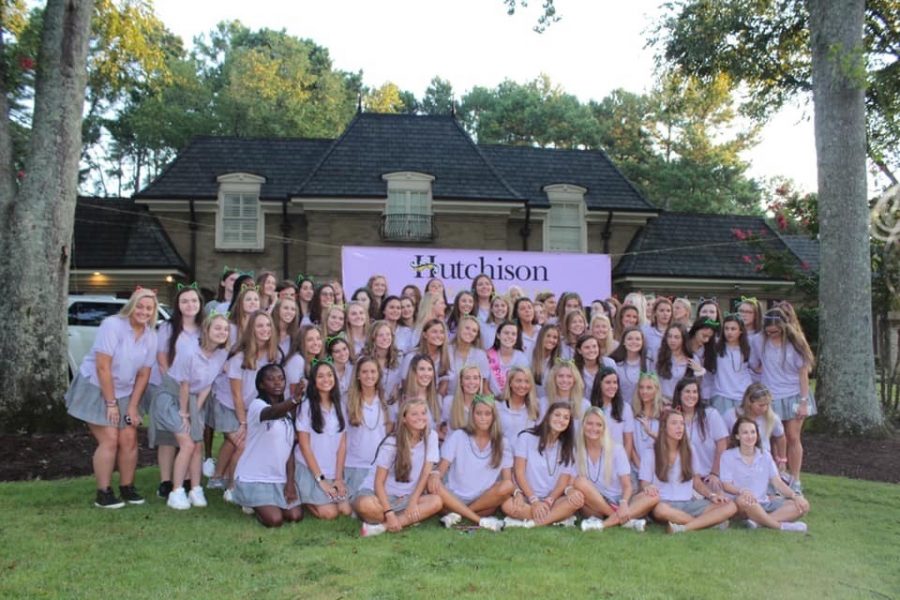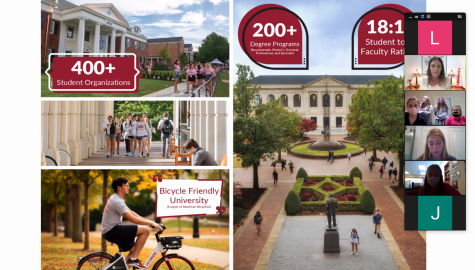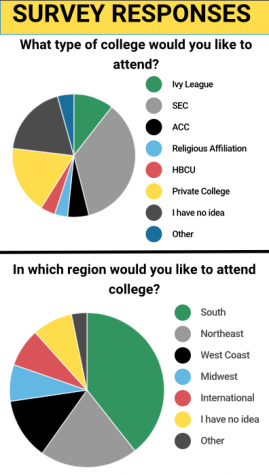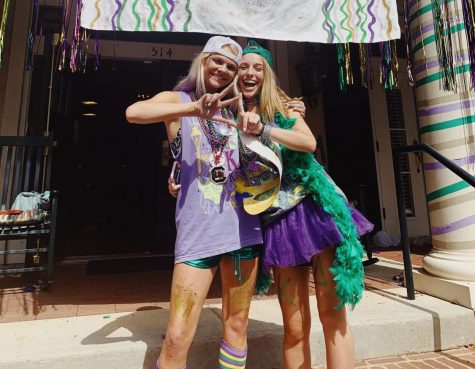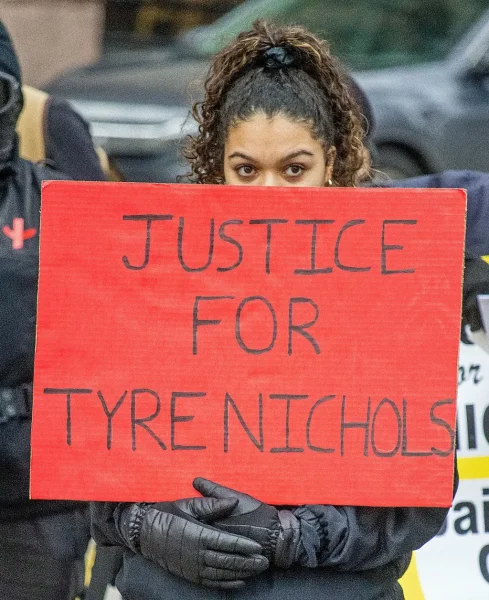Coronavirus Crisis: Through The Editors’ Eyes
As I sit in my house all day, almost all that I hear about is the coronavirus. When I watch the news, broadcasters allot all the time to the coronavirus; they relay updates on the number of cases, report the current death toll, analyze the latest conference with the president, play b-roll of empty grocery store shelves, and occasionally they show the weather. I am constantly bombarded with predictions of when the vaccine and cure will be ready for distribution to the public and when the hospitals and drive-thru testing areas will finally have sufficient testing supplies. When I sit down to eat my sixth quesadilla of the quarantine, I am reminded of all the local restaurants that are suffering because of a lack of customers. Then I join the Google Meet only to find that my entire class period is dedicated to relating everything we have covered this school year to the coronavirus. Even my social media feed is flooded with coronavirus memes. However, this is not a unique experience. I would predict that most students around the country, plus a great deal of the world, are seeing the same newscasts and memes as I am, but we are all responding differently. This is why I curated contributions from some former editors of Signpost; I wanted to hear about the ways in which the virus is impacting all of us in our respective stages of life and locations and normalize different reactions to the pandemic. Here are the responses (plus my own experience):
Abby Hays ‘20:
A month ago, the coronavirus was a joke. It was funny Tiktoks, not something that I thought would ever personally impact me. Now, as I hear about it each day, I remember how it is threatening all my plans for fourth quarter.
Hutchison is a little different from other schools because of the abundance of traditions that happen during the fourth quarter, many of them being centered around seniors. I spent 15 years at Hutchison working hard so that one day it would be my turn to walk down that aisle at Idlewild, cry my eyes out watching my senior slideshow on Black Friday, and have a sleepover with my whole grade the night before senior skip day. The past three years, I have done the calligraphy in the religious texts that graduates are given during commencement with their diplomas dreaming about when it was the class of 2020’s turn to receive them. I wanted to paint my uniform skirt with my college’s logo and have my classmates sign my polo on my last day of classes. Strangely, I even wanted to dance around the may pole with 80 of my best friends in front of my parents and some kindergarteners. Now, all of this may not happen. I spent 15 years waiting for my turn, and it might not even exist.
I know none of us in the class of 2020, at least at time of publication, have the coronavirus. I recognize that some people are dying, some have lost loved ones, and some are struggling to put food on the table because their work is shut down. Some people are facing some very tough struggles right now that I cannot even imagine going through, so it does feel a little bit selfish to complain about missing out on some traditions. But although those people might be experiencing harder trials than missing May Day, it still hurts. The pain we are feeling is still valid. It is normal to be sad at the thought of your graduation being cancelled and at not seeing all your classmates together again in person.
During my online English class recently, we read Ode to the West Wind by Percy Bysshe Shelley, which ends with the lines, “The trumpet of a prophecy! O Wind, / If Winter comes, can Spring be far behind?” Here, Bysshe seems to convey that when times are hard and it feels like the end, a new rebirth is coming soon. The sun will rise again, and we will get through whatever difficulties the winter brings, which in this case is probably the coronavirus. Currently, I am holding on to the hope that, like Bysshe addresses, there are brighter days to come.
Well, class of 2020, we are still all in this together. Right now, it doesn’t look like we thought it would when the student council chose the theme for the year, but I believe it is still true. Even though we are not all in the commons laughing, crying, making Tiktoks, and studying and even though we are not in le Bistro ranting about underclassmen skipping us, we are in this together. We are fighting the same battle, and we will get through it together.
Even if all of the senior traditions do not happen exactly as we planned, I am confident that Hutchison will do everything in their power not only to protect the safety and health of everyone in the Hutchison community, but that they will also work to conserve as many of the senior traditions as possible so that we can say a proper goodbye to the school at which we have all spent so many years. This is one of the reasons why I am so thankful to attend a school like Hutchison. All of the faculty, staff, and administration truly care about their students’ well being and always want the best for us.
So, it is difficult to be a senior right now. And I remember this everytime someone mentions the coronavirus. However, I also choose to remember the strength and resilience of the class of 2020. We will get through this.
Sam Tancredi ‘18:
From Hutchison, I moved across the world to study in Dublin, Ireland, where I major in Law and Political Science at Trinity College Dublin. This year, I decided to live in a homey student accommodation building in North Dublin, situated a nice 25-minute walk from the campus that quickly became an essential part of my daily routine. Along my commute, I would walk down this small cobble-stoned road called Moore Street, always bustling with venders and shoppers amongst preoccupied businessmen and women or students late for lectures, elbowing past the young children fleeing their mothers’ grips. Every morning, I was met with odd yells over the price of a bushel of grapes or someone being kicked out of the Polish market for taking all of the free samples. Quite used to this waltz through the crowd, I shifted past the usual figures, and never thought twice about the fish-smelling street or the odd combination of smells that emerged when I walked past the butcher.
St. Patrick’s Day weekend of 2020 was on the brink of arrival. My memories from last year are filled with wild color and celebrations larger than life; my friends and I spent the weekend in pubs around town, dancing and laughing at each parade that came through, and eating way too many potato-themed foods.
But this year, Dublin was different. My last walk into town was filled with something new – silence. Moore Street was empty; no venders were in sight. No children were running, no fish were sitting in the stands, no grapes were being heckled over—there was no one. I trudged through Ireland’s capital city, one of the only pedestrians in sight. I called my friend, unsure if there was something infinitely more serious going on than I knew. There were no colors, there was no evidence of any celebration coming. Only me. This was my first encounter with the coronavirus.
There is a lot I could say about how the coronavirus outbreak affected me, most of which I have described to my family through tears. I saw Europe hurting in a way I hope to never see again. Women were crying as they begged for someone to spare change to help them find space in a hospital. People were flooding the stores, picking up any smidge of food left on the shelves. Dublin went from a thriving metropolis to a zombie apocalypse overnight. No one left the confines of their homes. One of my dear friends was unable to get back to Italy where two of her family members had already passed away. Another friend’s sister was being treated in a hospital where they did not predict she had much longer, yet he was stuck in Dublin, unable to get through the already-closed borders in Europe. The crisis had changed within 24 hours, and my friends were stuck.
My parents called me on a Friday night and told me the news that President Trump had imposed a travel ban on those coming from Europe, and they wanted me home immediately. Suddenly, I found myself packing two years of my life into three duffel bags, saying goodbye to my best friends, and heading to the airport in less than 48 hours. Student accommodation in Dublin had already begun to issue notices asking students to leave—not only to prevent the spread of the virus, but also because they needed the beds to use as hospitals for patients. Ireland has nearly 4 million citizens; of this total, they estimate 200,000 will be affected. The country was preparing to hurt, but its leaders didn’t realize how much it was already hurting. Ireland was not ready for the reality that inevitably showed at its doorstep.
I spent 9.5 hours in the Dublin airport, from waiting in an insanely long bag-drop line to trying to get through the U.S. preclearance customs process. I saw families split when one member did not pass the screening process while the others tragically decided to leave and board their flight. People screamed as the customs agents forbid them from boarding a flight due to outrageous fever temperatures that would surely infect others. It does not serve anyone well to go into further details, but I will say it was truly the most traumatic travel experience I have ever faced.
I am grateful to be home, and I am hopeful that the United States is taking measures in effort to prevent the European tragedy from reaching us here. Though I am saddened to see many young people not taking this crisis seriously, I am comforted by the fact that this time is far out of our hands, and we must trust in the greater good to prevail. In my self-isolation, I have had time to reflect on the positive things that have come from this, and am evermore grateful that things worked out as they did in my favor—I was able to get a flight home, when there were delays, the airline assisted without hesitation, and by Monday night, my head hit my own pillow. I am grateful that technology has progressed so far that I am able to continue my education in an online platform as well as communicate with my friends who live all over the world. I am grateful for the environmental restoration that has come as a result of humans letting the earth breathe by staying indoors and reducing pollution. Finally, I am grateful that dogs remain unharmed by COVID-19, so I can spend another 10 days with my loving German Shepherd by my side. And hopefully soon, I will be able to get back to Dublin and spend a week visiting my friends and having the fun we are missing out on right now.
Maggie Loftin ‘17:
I am lucky. In all honesty, I am exceptionally lucky with regards to the COVID-19 virus. Unlike many, my job is stable. Unlike many, I know that I will be able to pay my rent next month. Despite this, I am resentful of the effects this virus will have on my life although I know I should be grateful for the advantages I have during this troubled time.
My key issue revolves around college graduation. As a senior graduating in May, my heart goes out to the millions of students across the globe who will no longer be able to celebrate their accomplishment at Commencement. While I am not especially concerned about missing this event, I am devastated for my family and friends who had already made plans to travel (in some cases, hundreds of miles) to see me walk at graduation. Even more than this, I mourn for the students who have been let down. I mourn for the friends and professors I will likely never see again. I mourn for the last month of college. I mourn for the classes I had so genuinely looked forward to.
High school seniors: I wish I could give you back what you are losing this spring. When I graduated, all I wanted to do was leave and go to college. Now, surprising as it may seem (especially for those of you who remember me), the last semester of senior year holds some of my most treasured memories. I wish I could give them to you. Hold your friends close (not literally, that’s dangerous right now). Be grateful for the time you have had together, and look forward to the spring, winter, and fall breaks when you will be able to come home and see the girls you have known for so long. Take solace in the knowledge that you will all be safer for the precautions taken, and that the Hutchison community will do everything it can to give you the best senior year possible, despite the situation we are all in.



